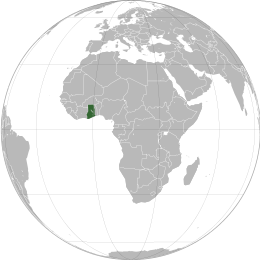Commons:Urheberrechtsregeln nach Gebiet/Ghana
|
Urheberrechtsregeln: Ghana Kürzel: COM:GHANA | |
 | |
 | |
| Schutzfrist | |
|---|---|
| Standard | 70 Jahre p. m. a. |
| Anonym | Veröffentlichung + 70 Jahre |
| Andere | |
| Panoramafreiheit | No |
| Gemeinsame Lizenzvorlagen | {{PD-old-70}} |
| ISO 3166-1 alpha-3 | GHA |
| Abkommen | |
| Berner Übereinkunft | 11. Oktober 1991 |
| Welthandelsorganisation-Mitglied | 1. Januar 1995 |
| URAA-Wiederherstellungsdatum* | 1. Januar 1996 |
| WIPO-Urheberrechtsvertrag | 18. November 2006 |
| *Ein Werk ist in der Regel in den USA geschützt, wenn es sich um eine Art von Werk handelt, das in den USA urheberrechtsfähig ist, nach 31 December 1928 veröffentlicht wurde und im Ursprungsland am URAA-Datum geschützt ist. | |
This page provides an overview of copyright rules of Ghana relevant to uploading works into Wikimedia Commons. Note that any work originating in Ghana must be in the public domain, or available under a free license, in both Ghana and the United States before it can be uploaded to Wikimedia Commons. If there is any doubt about the copyright status of a work from Ghana, refer to the relevant laws for clarification.
Geltende gesetzliche Bestimmungen
Ghana's current borders were established by the 1900s as the British Gold Coast. The country became independent of the United Kingdom on 6 March 1957
Ghana has been a member of the Berne Convention since 11 October 1991, the World Trade Organization since 1 January 1995 and the WIPO Copyright Treaty since 18 November 2006.[1]
As of 2018 the World Intellectual Property Organization (WIPO), an agency of the United Nations, listed the Copyright Act, 2005 (Act 690) as the main IP law enacted by the legislature of Ghana.[1] WIPO holds the text of this law in their WIPO Lex database.[2]
Allgemeine Regeln
Under the Copyright Act, 2005, No. 690,
- The authors rights are protected for the life of the author and 70 years after the death of the author.[690/2005 Section 12(1)]
- A jointly authored work is protected until 70 years after the death of the last surviving author.[690/2005 Section 12(2)]
- Where copyright in a work is owned by a public corporation or other body corporate the term of protection of 70 years from when the work was made or first published, whichever is later.[690/2005 Section 13]
- For an anonymous work or pseudonymous work, it is protected until 70 years have passed since the date of its publication or creation, whichever is latest.[690/2005 Section 14]
- It is a audiovisual work or sound recording, and 70 years have passed since the date of its publication or creation, whichever is latest.[690/2005 Section 15]
Public Domain: nicht frei
Siehe auch: Commons:Bezahlung des Gemeingutes
The following works belong to the public domain: works with expired terms of protection, works by authors who have renounced their rights, and foreign works that do not enjoy protection in the Republic.[690/2005 Section 38(1)] Subject to the payment of a fee that may be specified by the Minister a work that has fallen into the public domain may be used without any restriction.[690/2005 Section 38(3)] There shall be established by the Minister a fund for the deposit of any money that accrues from the payment of these fees.[690/2005 Section 38(4)] The fund shall be for the benefit of institutions that promote the arts, authors, performers, producers of sound recording, translators and the arts in general.[690/2005 Section 38(5)]
Folklore: non-free
An expression of folklore is protected against reproduction, communication to the public by performance, broadcasting, distribution by cable or other means, and adaptation, translation and other transformation.[690/2005 Section 4(1)] The rights of folklore are vested in the President on behalf of and in trust for the people of the Republic.[690/2005 Section 4(2)] These rights exist in perpetuity.[690/2005 Section 17]
A person who intends to use folklore for any purpose other than as permitted under section 19 shall apply to the [National Folklore] Board for permission in the prescribed form and the person shall pay a fee that the Board may determine.[690/2005 Section 64(1)] There shall be established a fund for the deposit of any fees that may be charged in respect of the use of folklore.[690/2005 Section 64(2)] The fund shall be managed by the Board and shall be used (a) for the preservation and promotion of folklore, and (b) for the promotion of indigenous arts.[690/2005 Section 64(3)]
Panoramafreiheit
Siehe auch: Commons:Panoramafreiheit
![]() Nicht OK. ({{NoFoP-Ghana}}) Article 19(1)(f) of the Copyrights Act, 2005 restricts freedom of panorama to cinema or television or in a broadcast by television.
Nicht OK. ({{NoFoP-Ghana}}) Article 19(1)(f) of the Copyrights Act, 2005 restricts freedom of panorama to cinema or television or in a broadcast by television.
Zitate
- ↑ a b Ghana Copyright and Related Rights (Neighboring Rights). WIPO: World Intellectual Property Organization (2018). Retrieved on 2018-11-04.
- ↑ Copyright Act, 2005 (Act 690). Ghana (2005). Retrieved on 2018-11-04.